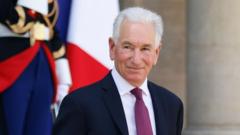In a robust diplomatic response, France has summoned US ambassador Charles Kushner following his open letter to President Emmanuel Macron, in which he made claims regarding the growing antisemitism within France, particularly since the onset of the recent Gaza conflict. Kushner, noting the comments align with sentiments expressed by Israeli leadership, stated that antisemitic incidents, including assaults on Jewish individuals and vandalism of Jewish establishments, have become pervasive in French society, akin to an "explosion" of hatred towards Jews.
The French foreign ministry reacted strongly to Kushner's assertions, categorizing them as "unacceptable" and emphasizing that the ambassador's criticisms interfere with France's internal matters, as protected under the 1961 Vienna Convention. In his letter, Kushner urged Macron to moderate his stance on Israel, claiming that remarks made towards the recognition of a Palestinian state might exacerbate antisemitic sentiments.
Kushner highlighted troubling statistics from France's own Interior Ministry that illustrate a troubling landscape for French Jews, offering to collaborate with French leaders to address these pressing issues. Meanwhile, Macron has publicly reinforced his condemnation of antisemitism as fundamentally opposed to the nation’s values while also increasing security measures for Jewish communities in the light of recent tensions.
The backdrop to this diplomatic spat is the ongoing war between Israel and Hamas, which erupted after a deadly attack by Hamas on Israel on October 7, 2023, resulting in significant casualties on both sides. France has indicated plans to recognize Palestine formally, with Macron advocating for a balanced strategy that emphasizes both the viability of a Palestinian state and the need for Israel’s security.
While the US continues to maintain its relationship with Israel, the French government has been poised to address humanitarian crises resulting from ongoing conflicts, further complicating the international narrative around antisemitism, nationalism, and human rights in the context of the Israel-Palestine situation.
The French foreign ministry reacted strongly to Kushner's assertions, categorizing them as "unacceptable" and emphasizing that the ambassador's criticisms interfere with France's internal matters, as protected under the 1961 Vienna Convention. In his letter, Kushner urged Macron to moderate his stance on Israel, claiming that remarks made towards the recognition of a Palestinian state might exacerbate antisemitic sentiments.
Kushner highlighted troubling statistics from France's own Interior Ministry that illustrate a troubling landscape for French Jews, offering to collaborate with French leaders to address these pressing issues. Meanwhile, Macron has publicly reinforced his condemnation of antisemitism as fundamentally opposed to the nation’s values while also increasing security measures for Jewish communities in the light of recent tensions.
The backdrop to this diplomatic spat is the ongoing war between Israel and Hamas, which erupted after a deadly attack by Hamas on Israel on October 7, 2023, resulting in significant casualties on both sides. France has indicated plans to recognize Palestine formally, with Macron advocating for a balanced strategy that emphasizes both the viability of a Palestinian state and the need for Israel’s security.
While the US continues to maintain its relationship with Israel, the French government has been poised to address humanitarian crises resulting from ongoing conflicts, further complicating the international narrative around antisemitism, nationalism, and human rights in the context of the Israel-Palestine situation.


















